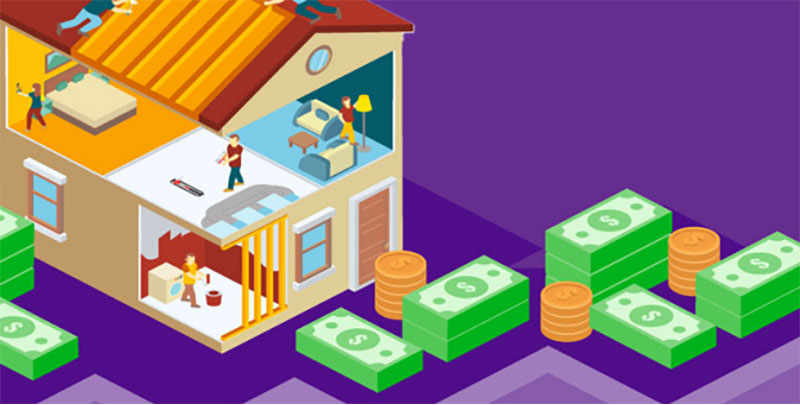Over the past decade, your housing requirements may have changed, making the home that once met your needs less appealing. A new house can always be purchased if the current one needs improvement. Renovation costs for a 2,000-square-foot home are $40,000 to $300,000. We have broken down every cost and provided recommendations for cutting costs.
A home renovation project could involve something as minor as fresh paint or wallpaper or as extensive as tearing the place up and starting over. Many variables can affect the final price tag of your project, so you must set a spending limit and prioritize your goals from the get-go.
Things to Think About When Renovate Your Home

1. Time and Labor
Double-check with the appropriate authorities before commencing any renovation project requiring a permit, such as an addition, electrical, or plumbing work. Permits typically cost around $800.
A refurbishment of a given size may necessitate the services of more than one subcontractor. The hourly rate of a construction worker might range from $20 to $150 and typically higher. The general contractor's fee normally takes up 10% - 20% of any budget.
2. Location
Regional pricing differences could reach 40%. Expenses in today's building industry are unique across the country. Generally speaking, urban construction costs are higher than their rural counterparts.
3. House Size, Room Count, and Design
The greater the location, the more you can expect to pay. HomeAdvisor estimates that it costs about $19,000 to fix up a 1,000-square-foot home but between $75,000 and $100,000 to do the same work on a 3,000 to 4,000-square-foot home. However, the asking price is sometimes proportional to the number of bedrooms. Renovating a kitchen can cost anywhere from $100 to $250 per square foot, whereas a bedroom will only set you back from $10 to $25 per square foot.
4. Architecture Style
The standard of living in different neighborhoods varies greatly. Condos have a higher per-square-foot cost for renovations ($40-$125) than apartments ($25-$60). Renovations of historic properties always cost more because of the need to retain original materials or recreate the original appearance with modern materials. Restoring a structure with historical significance often costs between $100 and $400 per square foot.
5. Site
Depending on your project's size, you may need to clear the area for development by cutting down trees and bushes or digging out a driveway. Site preparation costs anything from $1,200 to $4,000, with the upper end reflecting greater complexity.
6. Material Expenses
Materials for a home renovation can go through the roof. Purchasing new fixtures and fittings for your home remodel will consume most of your budget. The renovation project's cost is only sometimes directly proportional to the size of the project at hand.
Cost Determinants

1. Quantity-Based Pricing
Remodeling expenditures are highly discretionary and cannot be accurately estimated based on square footage alone. On average, a makeover might cost anything from $20 to $150 per square foot.
Without changing the house's primary framework (roof and walls), a makeover can be completed for less than $60 per square foot. The use of synthetic materials like laminate and vinyl and prefabricated modules for items like cabinetry and shower stalls is commonplace in these restorations. A moderate makeover, with new appliances and updated systems, might cost anywhere from $60 to $100 per square foot.
2. Remodeling Expenses by Category
The final price tag also determines how carefully you pick your renovation jobs. Adding a new room is the most expensive way to increase the square footage of your home. Kitchen remodels are typically more expensive than other rooms because of the high quantity of appliances and the high quality of the materials utilized. Renovations to smaller rooms, such as bathrooms and basements, tend to cost more.
Renovation Types
1. Expert Renovation
If you want to change an existing building, you should hire a professional contractor. A professional has the knowledge and experience to keep your home safe and compliant with all building codes. If you want to change your home's electrical or plumbing systems, hire qualified experts. Professionalism in these niche areas requires extensive training and study.
2. DIY Renovation
If you have the time and the patience, you may perform simple repairs and modifications independently. Some of the final touches, like new faucets or interior painting, can be doable by you. You can also choose to have your kitchen cabinets, counters, and lights prefabricated.
Conclusion
The scale of a renovation job is entirely up to the homeowner and their available resources. You can save money by tackling certain cosmetic projects on your own, but you should always consult specialists before making major structural or layout changes to your home. In addition, set a realistic budget and try to stay within it. Expect the unexpected throughout a renovation project, and be prepared with plenty of time and money for unforeseen costs.




